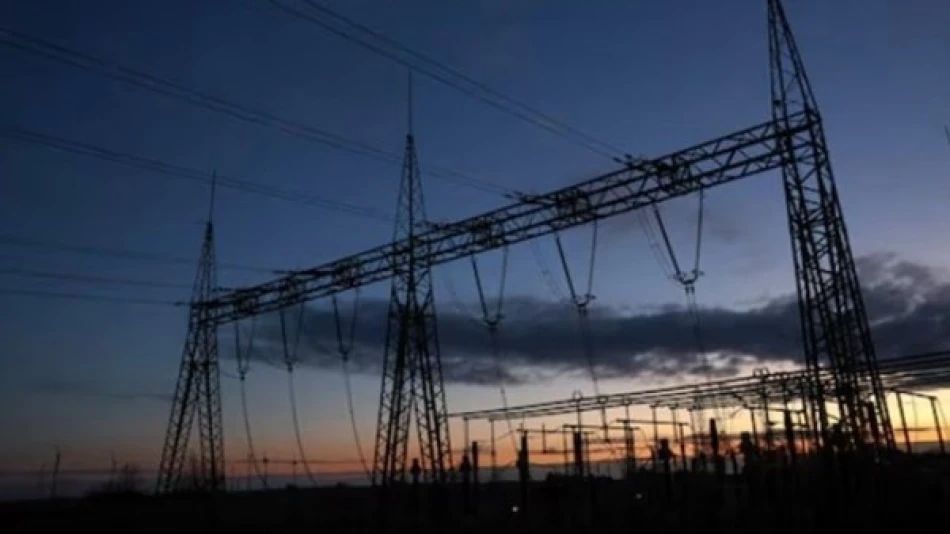
Berlin Faces Power Outage: 20,000 Homes Affected by Blaze
Berlin Power Grid Attack Exposes Critical Infrastructure Vulnerabilities
A suspected arson attack on two electrical towers in Berlin has left 20,000 homes and businesses without power for over 24 hours, highlighting the fragility of urban energy infrastructure and raising serious questions about the security of critical utilities across European capitals. The incident, which initially affected 50,000 properties, has forced authorities to implement emergency protocols while repair crews work to restore the damaged underground cable network.
Deliberate Sabotage Suspected in Southeast Berlin
Police believe the fire that broke out early Tuesday morning in the Johannisthal district was intentionally set, marking a concerning escalation in attacks on critical infrastructure. The blaze damaged electrical towers and destroyed underground cables, creating a cascade effect that knocked out power across a significant portion of Berlin's southeastern suburbs.
The timing and location of the attack suggest careful planning, as the targeted towers served as crucial distribution points for the broader electrical grid. This type of infrastructure sabotage has become an increasing concern for European security agencies, particularly given heightened tensions over energy security following recent geopolitical developments.
Complex Recovery Operation Underway
Technical Challenges Mount
Stromnetze Berlin, the city's electricity distribution company, faces a technically complex restoration process that could extend until Thursday evening. The fire damage to buried cables has forced crews to excavate and replace entire sections of the underground network—a time-intensive operation that cannot be rushed without risking further system failures.
Henrik Buster, spokesman for Stromnetze Berlin, has urged customers who have regained power to minimize electricity consumption, specifically avoiding high-energy appliances like ovens. This request indicates the grid remains in a precarious state, operating below normal capacity while repairs continue.
Emergency Services Stretched Thin
The power outage has created ripple effects throughout the affected areas. Fire departments established 15 emergency response centers after the standard 112 emergency number became unreliable in some zones. Medical facilities have been forced to evacuate patients from care homes to nearby hospitals, while 12 schools remained closed Wednesday morning.
Several tram lines have suspended service, disrupting public transportation for thousands of commuters and highlighting how quickly urban infrastructure can unravel when electrical systems fail.
Broader Implications for Urban Resilience
Infrastructure Security Under Scrutiny
This incident underscores a critical vulnerability that extends far beyond Berlin. Urban electrical grids across Europe rely heavily on centralized distribution points that, when compromised, can affect tens of thousands of people simultaneously. The attack method—targeting transmission towers rather than generation facilities—demonstrates how relatively small acts of sabotage can produce disproportionately large disruptions.
Security experts have long warned that electrical infrastructure represents a soft target for those seeking to cause maximum disruption with minimal resources. Unlike cyber attacks on power grids, which require sophisticated technical knowledge, physical attacks on transmission equipment can be executed with basic tools and planning.
Economic and Social Costs
The economic impact of the outage extends beyond immediate repair costs. Businesses forced to close or operate without power face revenue losses, while the city bears the expense of emergency response operations and alternative service provision. More significantly, the incident erodes public confidence in infrastructure reliability—a psychological cost that can persist long after power is restored.
The disruption also reveals how dependent modern urban life has become on continuous electrical supply. From emergency communications to medical equipment, transportation systems to educational facilities, the Berlin outage demonstrates the cascading effects that follow when this fundamental service fails.
Looking Forward: Prevention and Preparedness
As Berlin works to restore full electrical service, this incident will likely prompt a broader review of infrastructure protection measures across Germany and potentially throughout Europe. The relatively easy access to critical transmission equipment, combined with the severe consequences of its disruption, suggests that current security protocols may be insufficient for the threats cities now face.
The recovery timeline—potentially extending to Thursday evening—also highlights the need for more robust backup systems and faster restoration capabilities. In an era where infrastructure attacks are becoming more common, cities must balance accessibility for maintenance crews with security against deliberate sabotage.
Most Viewed News

 Layla Al Mansoori
Layla Al Mansoori






